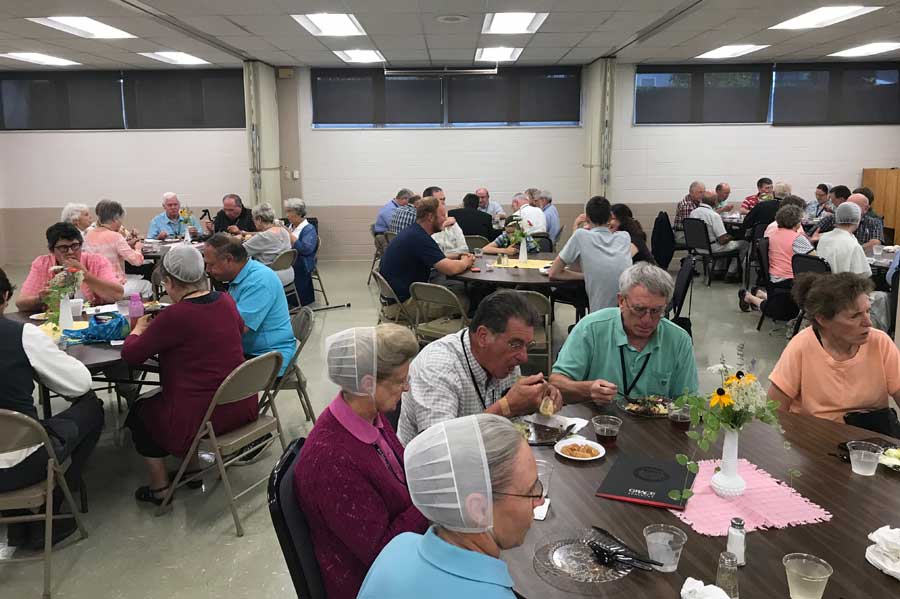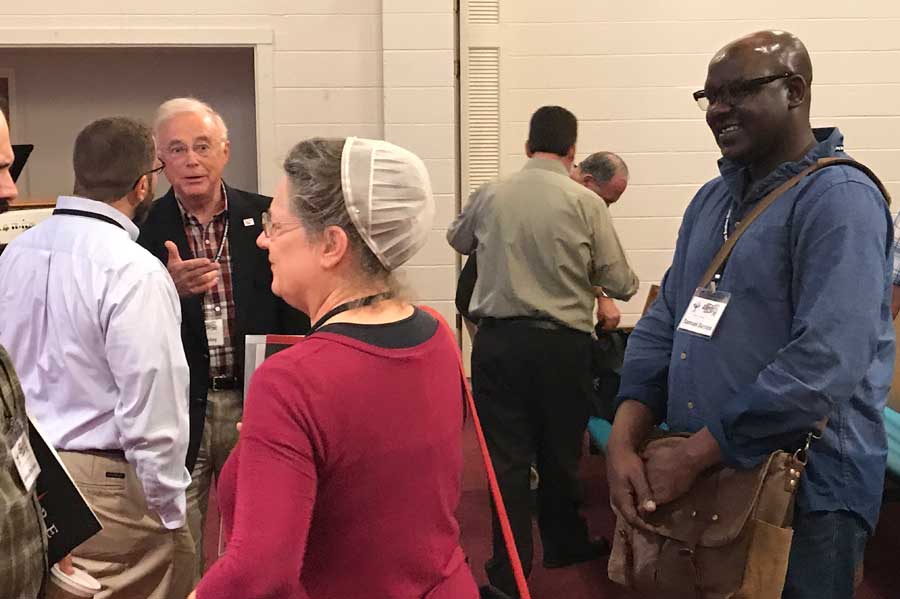Church of the Brethren Newsline
August 24, 2018
By Frank Ramirez
“They had never seen something like this, returning good for evil.”
The speaker was the Rev. Dr. Musa Mambula, a leader in the Ekklesiyar Yan’uwa a Nigeria (EYN, the Church of the Brethren in Nigeria) and current international scholar in residence at Bethany Theological Seminary. He was describing the reaction of three Muslim clerics after the Brethren rebuilt a mosque burned down by Boko Haram.
Mambula’s remarks came at the Sixth Brethren World Assembly, held Aug. 9-12 at Winona Lake (Ind.) Grace Brethren Church. It was sponsored by the Brethren Encyclopedia Foundation with the theme “Brethren Intersections: History, Identity, Crosscurrents.”
The event, held every five years, gathers Brethren from various denominations tracing back to the original 1708 group in Germany. Roughly 150 Brethren came together to hear speakers like Mambula share their unique perspectives on the Brethren movement but also to break bread together, take bus tours, worship according to three very different Brethren traditions, and, of course, eat home-made ice cream three nights in a row. Participants came from the Brethren Church, Church of the Brethren, Dunkard Brethren, Conservative Grace Brethren Churches International, Fellowship of Grace Brethren Churches, Old German Baptist Brethren, and Old German Baptist Brethren (New Conference).
Gary Kochheiser of the Conservative Grace Brethren Churches International led a bus tour to a site associated with the three-way split of the 1880’s and spoke from personal experience about just how painful it is to be involved in such a parting.
Jeff Bach, director of the Young Center for Anabaptist and Pietist Studies at Elizabethtown (Pa.) College compared the first Brethren and their cultural and religious neighbors to “a textured and colored checkerboard, if you will, where the pieces move. . . . In the end these (give) birth to a movement based on faith, the centrality of Jesus, and the spiritual effect of Bible study.”
Brethren Church scholar Dale R. Stoffer, described the slow change among Brethren to view cooperation with other Christians “not as a badge of shame but as a badge of honor.”
“We should not be fearful to cooperate with the Other,” Stoffer said, “but we dare not lose our unique sense of identity, a sense of our own otherness. The gifts of what Brethren may bring is a treasure that can only be given if we remain true to our own unique identity as Brethren.”
Archivist William Kostlevy of the Brethren Historical Library and Archives suggested that the Nigerian Brethren have had as profound an effect on American Brethren as the first Brethren missionaries had in Nigeria. Meanwhile, Bridgewater (Va.) College history professor Stephen Longenecker of the Church of the Brethren tracked the slow acceptance of the revival movement in America among the Brethren.
At the Old Order German Baptist worship held in North Manchester, where all the preachers sat in a long row at a table in the front of the sanctuary. Merle Flory, whose ministry is based in Chiang Mai, Thailand, spoke of the dangers inherent in being faithful: “We’re not called to be safe. We’re called to be obedient.”
Finally, Jared Burkholder of the Grace Brethren, Professor of History at Grace College and the Assembly coordinator, speaking at New Paris (Ind.) Church of the Brethren the following evening, called for all the Brethren groups to “strive for unity in our diversity,” “strive to disagree well,” and to “foster humble self-awareness.”
—Frank Ramirez is senior pastor of Union Center Church of the Brethren (Nappanee, Ind.)
Go to www.brethren.org/Newsline to subscribe to the Church of the Brethren Newsline free e-mail news service and receive church news every week.





